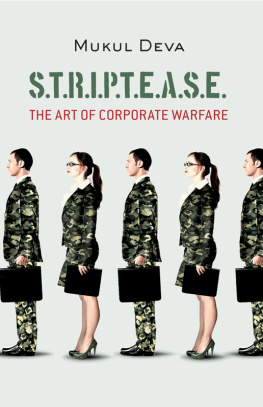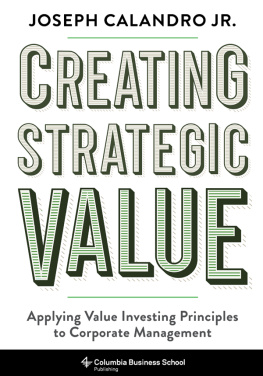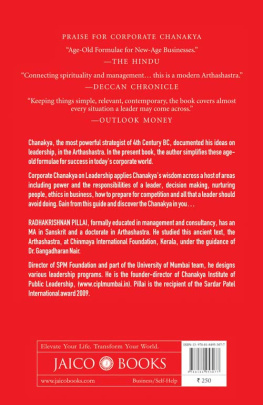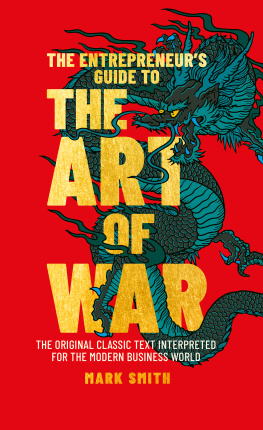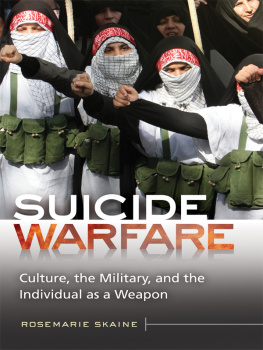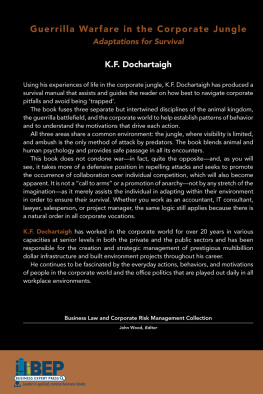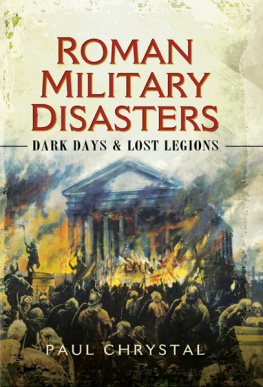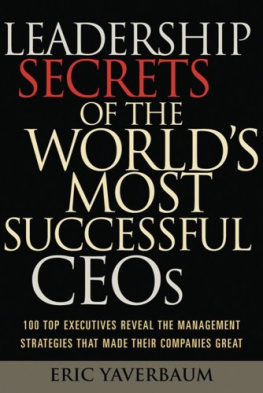
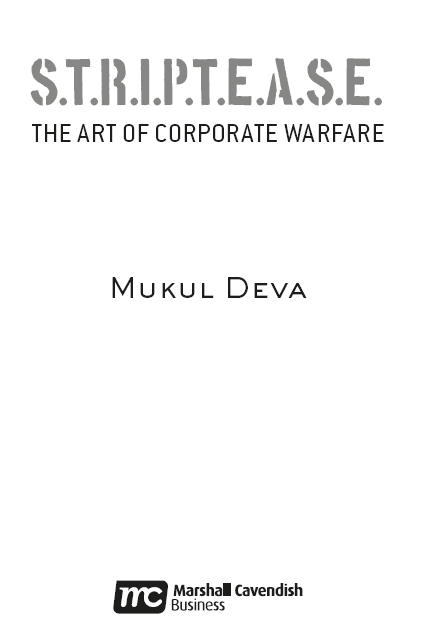
Cover design: Cover Kitchen Co. Limited
Book design: Adithi Khandadai
Copyright 2013 Mukul Deva
This book was first published in 2005 by Viking/Penguin Books India
This edition published in 2013 by Marshall Cavendish Business
An imprint of Marshall Cavendish International
Times Centre, 1 New Industrial Road, Singapore 536196
Tel: (65) 6213 9300. Fax: (65) 6285 4871
E-mail:
Online Bookstore: www.marshallcavendish.com/genref
Other Marshall Cavendish offices
Marshall Cavendish Corporation. 99 White Plains Road, Tarrytown NY 10591-9001, USA Marshall Cavendish International (Thailand) Co Ltd. 253 Asoke, 12th Flr, Sukhumvit 21 Road, Klongtoey Nua, Wattana, Bangkok 10110, Thailand Marshall Cavendish (Malaysia) Sdn Bhd, Times Subang, Lot 46, Subang Hi-Tech Industrial Park, Batu Tiga, 40000 Shah Alam, Selangor Darul Ehsan, Malaysia
Marshall Cavendish is a trademark of Times Publishing Limited
All rights reserved. No part of this publication may be reproduced, stored in a retrieval system or transmitted, in any form or by any means, electronic, mechanical, photocopying, recording or otherwise, without the prior permission of the copyright owner.
National Library Board (Singapore) Cataloguing in Publication Data
Deva, Mukul, 1961
S.t.r.i.p.t.e.a.s.e. : the art of corporate warfare / by Mukul Deva. Singapore : Marshall Cavendish Business, c2013.
p. cm.
ISBN : 978-981-4398-50-3 (pbk.)
eISBN: 978 981 4435 86 4
1. Industrial management. 2. Strategic planning. I. Title.
HD31
658.4 -- dc23 OCN812159849
Printed in Singapore by KWF Printing Pte Ltd
dedication
This book is dedicated to my mother, the late Dr Krishna Deva. She was and will always be my inspiration.
God couldnt be everywhere, so He made mothers.
To my daughters, Mehtab and Meher, and my son, Aryan, endless sources of joy for me. Their even you can do it, dad! rings out clearly in my head every time I switch on the computer and get down to writing.
In war, more than anywhere else in the world, things happen differently to what we had expected the commander is the victim of a hundred thousand impressions, of which the most have an intimidating, the fewest an encouraging, tendency therefore, only an immense force of will, which manifests itself in perseverance, can conduct us to the aim.
Karl von Clausewitz
contents
preface
It was in the army that I really learnt the nitty-gritty of business and corporate warfare. I seriously doubt that any business school anywhere could have prepared me for the corporate jungle the way my stint in the Indian Army did.
When I quit the army and started my business, all I had was about twenty years of army training and experience, a few thousand rupees as start-up capital, the blessings of my mother and God, and confidence in myself.
In March 2002, while exchanging e-mails with one of Indias top industrialists, something regarding situation recovery, client perceptions and customer relations came up that compelled me to take a deep, hard look at my business. I realized that my company was merely a photocopy of any standard military unit. Almost every little drill and procedure had been picked up and replicated in toto.
Instinctively, I applied almost every Principle of War that the army had grilled into me. I guess regimentation from the age of seventeen had ensured that this was the only way of working I knew. The result was a highly motivated organization that grew rapidly and is chugging along quite well even now.
We, my partner and I, were first-generation businessmen with almost no capital when we started out. For the first few years, tea and cigarette money would be at a premium by the 18th of the month. (Then we were able to survive until the 26th before poverty struck. Now we actually face the end of the month without a shudder.) Of the dozen or so managers we hired within three years, the most qualified was this fellow who had just about managed to graduate through correspondence. None of the managers whom we hired or promoted had any specialized training or skill-sets when they came to us. Most were fresh out of school or college or had been knocking around doing odd jobs when we discovered them. We simply trained them en route.
Amateurs built the Ark.
Professionals built the Titanic.
Anonymous
That is how we started out, and how we move along even now. Turning all this around in my mind, I realized how alike war and business are. I put through a scanner the 100 or so corporations that my company deals withand MSD Security Pvt Ltd deals with some of the best in Indiaand began to study their operations with a toothcomb. I saw things that amazed me: ultra-qualified managers who confounded me, huge corporations that blundered along in such obvious ways that bewildered me
I saw companies reinforcing failing products with everything in their inventories simply because their egos would not allow them to acknowledge failure.
I saw a company that had installed a card reader on its toilet doors. Just what was it trying to track? How many times who went to the toilet? How much time they spent there? Or who stole the toilet paper?
Another company had hired someone specifically to ensure that no one was served more than one cup of coffee or tea during the beverage break. This additional employee must have cost the company more than the extra tea or coffee that the fifty-odd staff members might have asked for.
I saw companies spend thousands every month on financial controllers to keep track of and question paltry bills and expenses. Imagine the logic in trusting someone to go to another city, make a sales call and bag an order worth millions but not trusting them to select a hotel that was appropriately located and priced!
I saw highly trained professionals and huge corporations trying to reinvent the wheel. Or fix things that already worked. Or evolve serpentine procedures for the simplest of tasks.
The more I see how corporations work, the more I tend to see the sheer wisdom of Dilberts Principle: The least effective workers are systematically moved to the place where they can do the least amount of damage: management.
More often than not, no one dares to ask whether a particular thing is worth doing or whether it can be done far more simply and cost-effectively.
Why are we reluctant to learn from the past? Even military greats such as Napoleon did not hesitate to emulate the lessons given by Alexander the Great.
In this book, I have tried to draw lessons from military history to offer proven, tested and easily applicable solutions to the three most common problems that afflict companies, businesses and organizations everywhere.
1. Common sense is commonly missing and seldom applied.
2. Everybody is running around trying to fix things that already work.
3. People, at all levels, often forget the aim.
This book aims to explain the origins of, and bring to the forefront, the Principles of War, acronym-ed by me into S.T.R.I.P.T.E.A.S.E. I have not coined, evolved or discovered these principles, but distilled them from reality, as they existed in the times of Alexander the Great and as formalized by armed forces over the centuries.
Every professional armed force the world over follows these Principles of War, albeit with minor differences in how they are worded, and their relative importance. My aim is to highlight how these can be applied to life, work or business to help run it in the most commonsensical, simple and cost-efficient manner.
Next page
